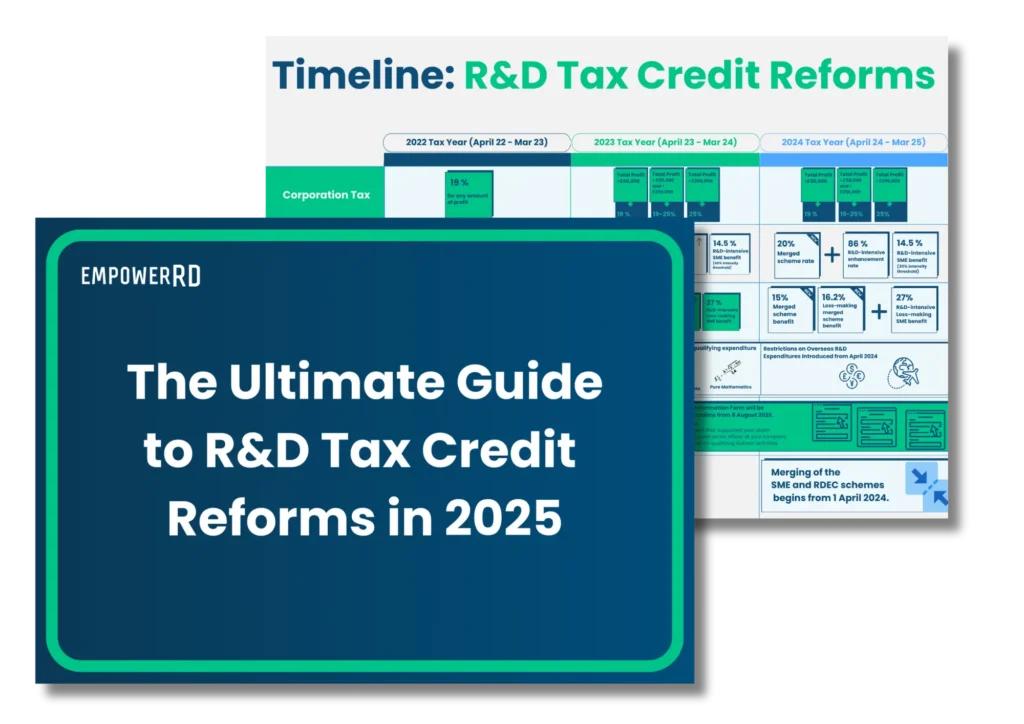The landscape of R&D tax relief in the UK has seen notable changes in recent years, with significant reforms increasing complexity and effort for companies claiming, and more reforms are on the way. The progression of the Finance Bill 23-24 has been a key point of speculation and concern, particularly with the upcoming Spring Budget announcement on March 6th. At the core of the debate lies the government’s proposal to merge the R&D tax credit scheme alongside the existence of the R&D-intensive SME scheme, a move that has sparked a dialogue about the pace of change and the need for clear guidance.
The House of Lords Sub-Committee
A recent report from the House of Lords Finance Bill Sub Committee has highlighted the concerns prevailing in the industry. Criticising the hurried introduction and lack of clear operational guidance in the proposed changes, the report suggests delaying the merged scheme’s implementation until April 2025. The committee argues that this extension would give businesses more time to adjust to the new environment and better understand the rules and expectations.
Moreover, the Lords raised questions about R&D-intensive SMEs, proposing that maintaining two separate schemes could hinder efforts to simplify the tax relief process. The suggestion to reduce the R&D expenditure threshold from 40% to 30% has received varied reactions, showcasing diverse opinions within the industry.
Industry reaction and government stance
The government’s response has not fully embraced the committee’s recommendations. Yet, there’s anticipation that feedback will be acknowledged. Industry stakeholders, especially R&D advisors and SMEs, are urging clarity and a phased approach, highlighting the significance of stability in R&D tax policy.
Predictions for the Spring Budget 2024
Given the current climate of concern and the House of Lords’ pointed recommendations, several scenarios could unfold in the Spring Budget 2024:
- Full acceptance: The government could take the House of Lords’ feedback to heart, announcing a delay in implementing the merged R&D tax relief scheme to April 2025. This scenario would likely be met with relief from the industry, providing a clear timeline for businesses to prepare and adapt. It would also allow for a more thorough consultation process, potentially leading to refinements in the scheme that address current criticisms.
- Partial adjustments: A more nuanced approach could involve the government upholding the 2024 implementation date while introducing substantial modifications to tackle specific issues. This may entail offering comprehensive guidance on the scheme’s functionality. Notably, HMRC has recently initiated a consultation on its preliminary guidance on subcontracting and overseas restrictions, anticipating similar action for the consolidated scheme. However, time is running short, with the budget deadline fast approaching.
- Complete disregard: It’s possible the government will proceed as planned without substantial changes or delays. This scenario would signal a strong commitment to the current timeline and framework, potentially sparking significant backlash from the business community. It would underscore the importance of immediate, proactive engagement by businesses to navigate the new landscape.
- A new consultative approach: An alternative, optimistic scenario might involve the government announcing a comprehensive consultation process. This could lead to a temporary pause on the merger, allowing for a more inclusive dialogue with stakeholders to refine and possibly rework the proposed changes. Even if the government proceeds with the planned merger of the R&D tax relief scheme, there is a prevailing sentiment within the R&D community that a new consultation process would be beneficial.
In any case, the upcoming Spring Budget will be a pivotal moment for R&D tax relief in the UK. Businesses and advisors alike should prepare for a range of outcomes, staying informed and agile in their planning. The hope is for a balanced approach that supports the UK’s innovation ecosystem while addressing the practical concerns of those who contribute most directly.
“As we look forward to the Spring Budget, we remain optimistic about the government’s approach to R&D tax relief reforms. This is an exciting opportunity for UK innovation to flourish further. We support a thoughtful strategy that incorporates valuable feedback from both our industry and the House of Lords, reinforcing the UK’s position as a leader in R&D. At EmpowerRD, we’re poised to help our clients navigate the evolving landscape, making sure they fully benefit from the new scheme,”
Hari Sandhu, Founder and Executive Chair
How EmpowerRD is preparing
At EmpowerRD, we’re on top of these shifts; we have put measures in place to ensure our clients smoothly shift to the new scheme with minimal disruption. The agility of our platform and our team’s proactive approach enables us to adapt to the upcoming reforms swiftly.
We’ve hastened updates to our platform to comply with the latest legislative requirements, ensuring our clients confidently benefit from R&D tax relief. Our dedication to staying ahead guarantees EmpowerRD clients can rely on seamless support, regardless of how the R&D tax relief landscape evolves.
Keep informed
We closely monitor the Spring Budget and will release our new podcast on March 11th. In this episode, our founder, Hari Sandhu, will discuss the crucial insights from the Spring Budget, keeping you informed. To ensure you don’t miss out, subscribe now.












